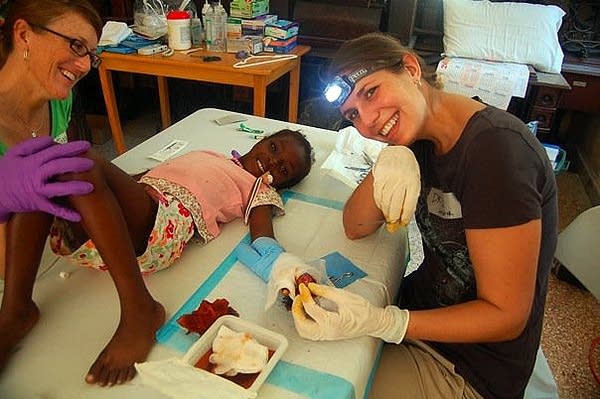Minn. doctors helping Haitians at makeshift hospital

The medical emergency in Haiti in the aftermath of the Jan. 12 earthquake that devastated Port-au-Prince grows more desperate by the day, two Minneapolis doctors said.
Jen Halverson, a fellow in pediatric emergency medicine at Children's Hospital and at the University of Minnesota, said doctors are working in unimaginable conditions.
"You know, we're doing things that no one in their right mind would do on a kitchen table," said Halverson, who on Friday practiced medicine on an open porch amid the ruins outside Haiti's capital. "But there's no other options."
Doctors are cutting off arms and legs and fingers -- sometimes on two people at the same time, said Ed Lord is an emergency management consultant from Burnsville who is running the makeshift hospital.
Create a More Connected Minnesota
MPR News is your trusted resource for the news you need. With your support, MPR News brings accessible, courageous journalism and authentic conversation to everyone - free of paywalls and barriers. Your gift makes a difference.
"We're doing amputations," Lord said Friday morning. "In fact as we speak, we're doing one, maybe its going to be two in the next ten minutes."
Halverson and Lord are among dozens of people who moved into an orphanage run by Florida-based Heartline Ministries and turned it into a medical outpost. Children's Hospital agreed to let her go and other doctors are covering her shifts. Another relief organization, Providence Ministries, paid to get Halverson to Haiti.
Four physicians and several nurses flew in with about more than 1,500 pounds of medical supplies. They transformed a house into an emergency room and operating room.
"We have operating room area where we're doing fairly major surgery on plastic tables," said Halverson, the makeshift hospital's medical director.
"You know, we're doing things that no one in their right mind would do on a kitchen table."
There also is a recovery area and a second house doctors are using as an in-patient ward for 21 patients, she said.
The doctors are in Tabarre, a suburb of Port-au-Prince, and about a mile from the airport. Speaking via internet phone, they said it is hard to tell what's going on in the rest of the devastated capital, because communication is poor.
But one thing is clear: the earthquake was followed by a second, insidious crisis -- a medical one.
"People have been walking around with open, gaping wounds and have had nothing put perhaps one bandage placed over it," Halverson said. "And so all of them have infections. Many of them have severe infections of gangrene, and that's what leads to them having limbs that are not able to be spared, and having to be amputated."
There also is an urgent need for more intravenous antibiotics to treat the injured, Halverson said.
Other hospital personnel have heard that as many as 20,000 people may have succumbed in recent days to the wave of infections that is sweeping through the injured that survived the quake.
The hospital is using a generator to power its medical operations, but fuel costs as much as $15 a gallon. The hospital has sent people as far as the neighboring Dominican Republic to try and find fuel, the doctors said.
There are signs that desperate Haitians are increasingly turning on one another, Lord said.
He said a crowd of survivors was living on a nearby soccer field, afraid to stay in what shelter was left standing by the earthquake.
"Someone through the goodness of their heart came in and gave these people brand new Coleman tents," Lord said. "That night, the gangs came in with machetes and took the tents from them so that they could turn around and sell them and make money. We are seeing patients here that have had arms chopped off by machetes."
From their compound outside Port Au Prince, Lord and Halverson say it's difficult for them to tell what relief is coming.
Their hospital is just a mile from the airport, but they're trying to reach personnel from the USNS Comfort, a Navy hospital ship off shore, to resupply them with morphine and other drugs.
They brought a satellite phone and computers to tell Haiti's story to Minnesota, as best they can. Halverson also is reaching out through social media, such as blogs and Facebook, pleading for help for the people she's treating -- and the thousands of others she can't care for.
Halverson and Lord say the only reliable route for aid is still the simplest -- through a bank.
"We need some hard cash, because this is the only way you can deal with things down here," Lord said. "You don't have time to barter. You say, I need X. And they say well, X costs this much, and they probably jacked it up time, you know. But that's the reality up here. This is Haiti."
The doctors say they expect to keep the effort up through March.
You can see photos from the hospital here (Warning - some photos show graphic images):
